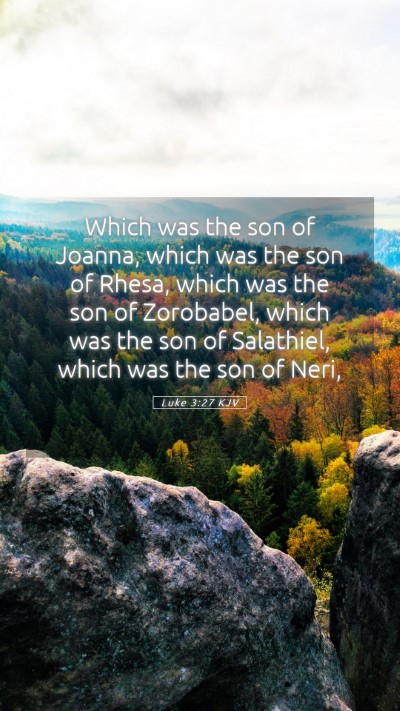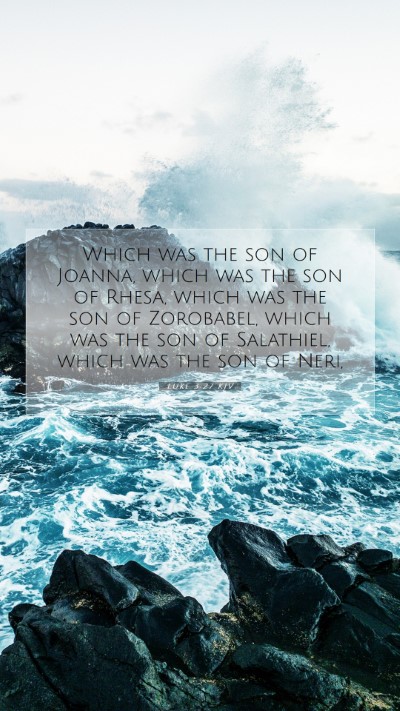Bible Verse Meaning of Luke 3:27
The Bible verse Luke 3:27 is often cited in discussions about biblical genealogy and the significance of Jesus' lineage. In this context, we explore the deeper meanings and interpretations provided by esteemed public domain commentaries.
Overview of Luke 3:27
Luke 3:27 refers specifically to the genealogical list of Jesus, illustrating His lineage, which is crucial for establishing His identity and fulfilling prophecy. Here, it reads:
"The son of Joannas, the son of Rechab, the son of Shealtiel, the son of Zerubbabel."
Understanding the Genealogy
Genealogy in the Bible is not merely a list of names; it serves several theological and historical purposes:
- Establishes Identity: It shows Jesus' rightful place in the lineage of David.
- Fulfillment of Prophecy: It links Jesus to specific Old Testament prophecies, affirming His role as the Messiah.
- Historical Context: Genealogies provide a timeline that situates Jesus within Jewish history.
Commentary Insights
Insights from public domain commentaries provide a richer understanding of this passage:
Matthew Henry's Commentary
Matthew Henry emphasizes the importance of each name in the genealogy, noting that every individual mentioned contributes to the unfolding plan of redemption. He reflects on how the mention of lesser-known ancestors highlights God's sovereignty in preserving a faithful remnant throughout history.
Albert Barnes' Commentary
Albert Barnes points out that this genealogy serves to remind believers of Jesus' humble beginnings and the diverse nature of His lineage, which includes both kings and commoners. He suggests that this diversity reflects God’s acceptance of all people, paving the way for broader inclusivity in the Kingdom of God.
Adam Clarke's Commentary
Adam Clarke focuses on the historical accuracy of the genealogies presented in the Gospels. He discusses the variations between the genealogies of Matthew and Luke and what they reveal about the distinctions in their audiences: Matthew to a Jewish audience emphasizing royal lineage, while Luke focuses on a broader humanistic portrayal.
Theological Significance
This verse and its parent context invite deeper theological reflection:
- God's Faithfulness: The genealogy underscores God's faithfulness throughout generations.
- Inclusiveness of Salvation: Indicates that salvation is offered to all humanity, transcending ethnic and social boundaries.
- Preparation for the Messiah: Establishes a historical continuity leading to the coming of Christ.
Application of Luke 3:27 in Daily Life
Understanding this verse can enhance personal faith and daily living:
- Appreciation of Heritage: Reflect on one's own spiritual lineage and the faith passed down through generations.
- Recognizing God's Plan: Acknowledge that God works through history to fulfill His purposes.
- Embracing Diversity: Celebrate the inclusion of all people in the gospel message and strive to reflect that in interactions with others.
Cross References
Luke 3:27 connects with several other scriptures:
- Matthew 1:12-16: The genealogy of Christ according to Matthew.
- Isaiah 11:1: Prophecy concerning the branch from Jesse.
- John 1:46: Discussion of Jesus' origins connecting to Nathaniel's skepticism of Nazareth.
Conclusion
Luke 3:27, while often overlooked, serves as a powerful reminder of the significance of Jesus' lineage. Through a combination of genealogical data and profound theological insights, we gain a fuller understanding of biblical history, God's redemptive plan, and the inclusive nature of Christ's message.
For those engaged in Bible study groups or looking for online Bible study resources, this exploration into Luke 3:27 provides essential Bible study tools, Bible study guides, and Bible study lessons to deepen your understanding of scripture.


